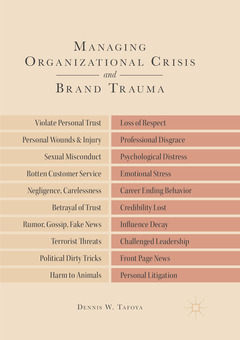Description
Managing Organizational Crisis and Brand Trauma, Softcover reprint of the original 1st ed. 2018
Language: English
Subjects for Managing Organizational Crisis and Brand Trauma:
Publication date: 08-2018
Support: Print on demand
Publication date: 09-2017
Support: Print on demand
Description
/li>Contents
/li>Biography
/li>Comment
/li>
1. Organizational Health: The Capacity to Manage Events (and their Downsides) requires an Organizations Steeped in Competent and Capable Individuals.- 2. Trauma in Organizations: Triggering Organizational Trauma and the Trauma Model.- 3. Brand Trauma.- 4. When Trauma isn't a given (When an event that should produce trauma, doesn't.)- 5. Measuring brand trauma.- 6. Introducing, Re-establishing and Maintaining Order.- 7. Trauma Never goes away; It Still has to be Managed.- 8. Conclusions -- Whether for legal or illegal reasons: Examine results in terms of your Purpose, Performance, and Progress.
Dennis Tafoya (PhD, the University of Michigan, MS, the University of Pennsylvania) has more than 30 years of academic and business experience across a variety of fields. He is president of CompCite Inc., an international research and development firm that focuses on factors that affect performance at individual, group and organizational levels. He has authored the "Advance/Recover Database" an inter/intranet tool to improve individual knowledge, decision making and problem solving capabilities, numerous articles and four books: The Effective Organization (2010), Organizations in Crisis (Palgrave/Macmillan, 2013), Marginal Organizations: Analyzing Organizations at the Edge of Society’s Mainstream (Palgrave/Macmillan, 2014) and Managing Organizational Crisis and Brand Trauma (Palgrave/Macmillan, 2017).
Tafoya has significant international experience ranging from numerous papers and research studies, hands-on work with international management and sales teams and has prepared specific whitepapers for the European Union describing the role of "Steel as a Global Industry" (presented at European Community Conference, la-Napoule, France 1992); the possible role and emergence of Dubai as a money-broker for the mid-east, ("Dubai, UAE: Fountainhead for the Mid-East's 21st Century", November 12, 1997); and, as a guest of the Yeltsin government to examine management issues in a post-Soviet Union society ("Russia and Its Move from Communism to Free Market Economy: Challenges for Management" August, 1999). He has written and holds patents related to knowledge management (US 6,834,274) and performance forecasting (US 7,865,383), has participated in government programs aimed at measuring competency, labor relations and the value of STEM (Science, Technology, Engineering and Mathematics) in business and industry.




